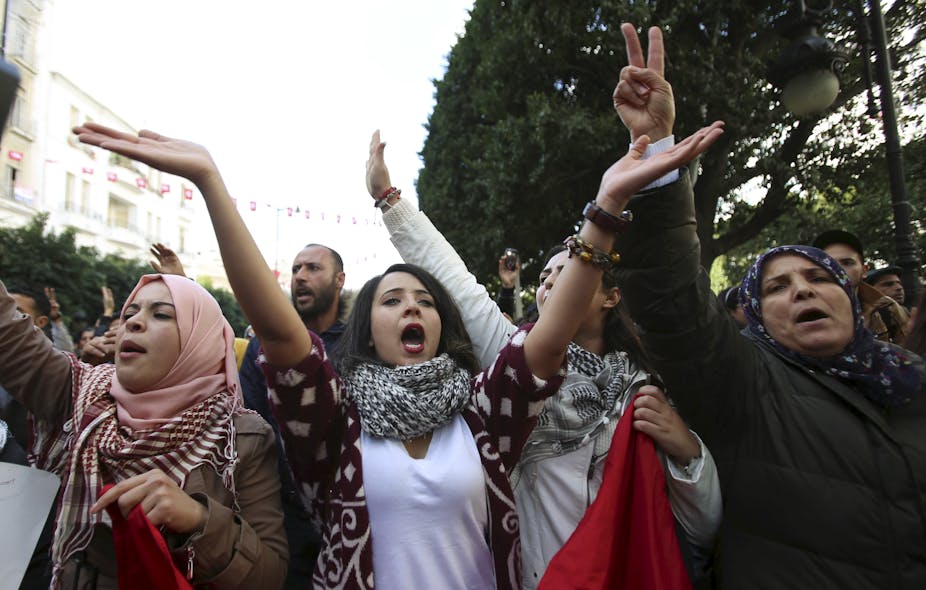In late 2010 demonstrations in Tunisia sparked a popular push for democratisation through the Arab world in what became known as the Arab Spring. The uprisings saw Tunisia emerge from 23 years of despotic rule under President Zine El Abidine Ben Ali. Though the country has made substantial gains since its transition, it still needs to safeguard its fledgling democracy.
Political reform and democratic transition in Tunisia – including the adoption of a landmark constitution – was lauded by the international community. Where democratic reversals occurred in other Arab Spring countries, the country was considered a lone success story.
But it is now facing a plethora of challenges to its democratic gains. These include corruption, terrorism, youth unemployment of about 40% and weak economic growth prospects.
The failure to meet rising expectations and address growing discontent, particularly among the youth, were key causes of the Ben Ali regime’s downfall. More specifically, the corrosive effect of corruption, including its deleterious effect on trust for political authority, catalysed change.
In this context, reform remains a tenuous and fragile process.
Explaining Tunisia’s success
Several factors explain Tunisia’s successful transition. The military showed restraint during the transition process, and there was a general willingness to reach a political compromise. Most important was the proactive approach taken by Tunisian civil society.
Four civil society groups, known as the Tunisian National Dialogue Quartet, were instrumental in pulling the country back from the brink of civil war.
By building consensus across political groups, the quartet paved the way for a peaceful transition. This included drafting a new constitution and setting out a programme for bureaucratic reform. The group received the 2015 Nobel Peace Prize in recognition of its efforts.
A show of political will
In 2013 Tunisia affirmed its commitment to open and transparent government when it joined the Open Government Partnership (OGP). The global, citizen-centred initiative aims to enhance transparency and public accountability in government. Access to information, citizen participation and accountability are the central tenets of open government.
Most of the 69 participating countries are in South, Central and North America, Europe, Asia, Australasia and Africa. They include Brazil, Canada, Turkey, Ukraine and South Africa.
Tunisia’s commitment to political reform is recognised as being in line with the OGP mandate to “improve the quality of governance and public services”.
The country has adopted a pragmatic approach to its participation in the initiative. It has made a range of commitments to enhance access to information and improve public accountability. These include publishing audit report findings and training civil servants in ethics.
But challenges remain.
Ongoing challenges
Government corruption, one of the main drivers of the Arab Spring, remains an issue. Civil society organisations say rent-seeking is pervasive, particularly at local government level.
Jazem Halioui, a researcher for the Independent Reporting Mechanism of the OGP, notes in a progress report that:
… under [the] Ben Ali dictatorship, the regime used state corruption as a means for illicit enrichment and silencing dissent.
The report has highlighted concerns around the country’s handling of the issue and calls for implementation of anti-corruption legislation.
The state faces further threats to democratic consolidation.
The tabling of the draft Economic Reconciliation Law in July 2015 was widely condemned. The law, which would indemnify corrupt Ben Ali-era public officials from prosecution, marked a low point of the transition.
Recent terror attacks have added to the woes, further revealing the fragility of the gains the state has made.
The OGP report notes that an ongoing state of emergency, which was declared after the Sousse beach attack last June, has made the climate difficult for civil protests. And human rights organisations have reported torture of detainees, a hallmark of the Ben Ali era.
Optimism about the future
Civil society organisations are optimistic about the role the OGP can play in deepening democratic reform in Tunisia.
The country has committed to:
improving transparency in its administrative system;
developing an open budget system;
improving transparency in public infrastructure projects; and
regulating natural resources in a transparent manner.
Halioui’s report further calls for the government to improve transparency in areas such as the judicial system and the security forces.
In July 2014 the World Bank approved a US$300 million program to improve local governance. The program aims to strengthen service delivery and public accountability. But continued public-sector reform, especially at the sub-national level, is vital to ensure stability in the country.
Tunisia’s path towards democratic consolidation is important, both domestically and for the region. A key litmus test for the fledgling democracy will be whether the formal political process, set against a turbulent regional political economy, can sustain reform efforts.
This will require safeguarding the space for a robust and vibrant civil society to participate meaningfully, and to push through the reforms that are so badly needed.
The author, an independent governance consultant, reviewed the Tunisian OGP Progress Report.

